MAKE A DONATION TOWARDS CARES DURING CAH AWARENESS MONTH
Nothing that we have accomplished since our founding in 2000 has been possible without the support of our community. Thank you for your continued partnership with CARES Foundation. We are looking forward to working more with our community in the future!
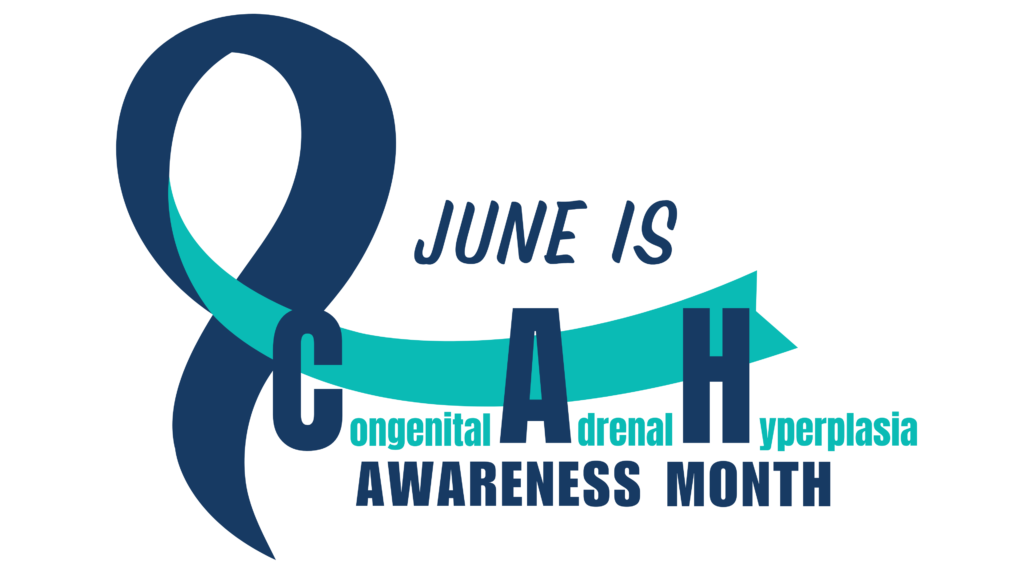
Share your story!
Sharing your story can be incredibly important and helpful to members of our community in finding comfort that they are not alone on their CAH journeys. We encourage you to share your experience throughout CAH Awareness Month by reaching out to CARES with an excerpt of any length about any part of your CAH journey. You may also include photos in your submission.
If you have any questions, or would like to learn more about how you can share your CAH journey please do not hesitate to reach out! All questions and submissions can be directed to: john@caresfoundation.org.
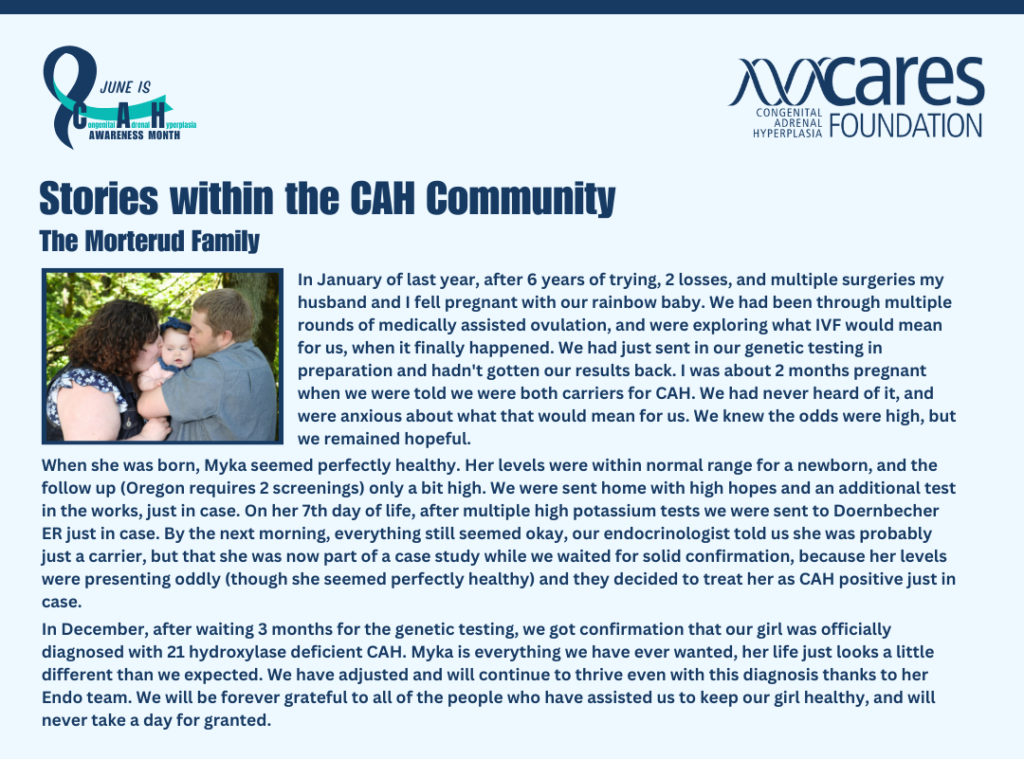
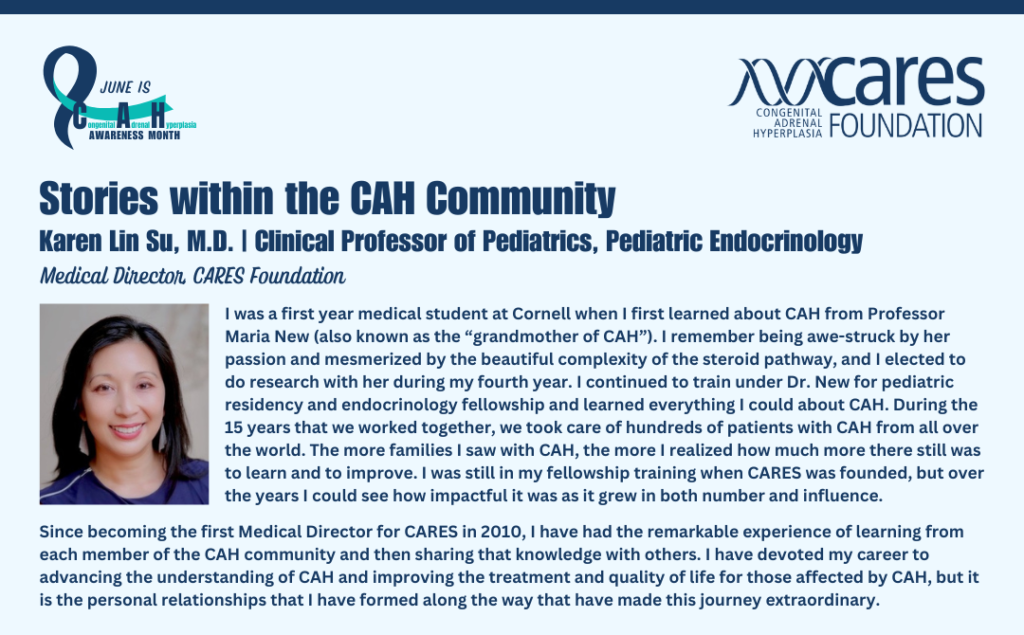
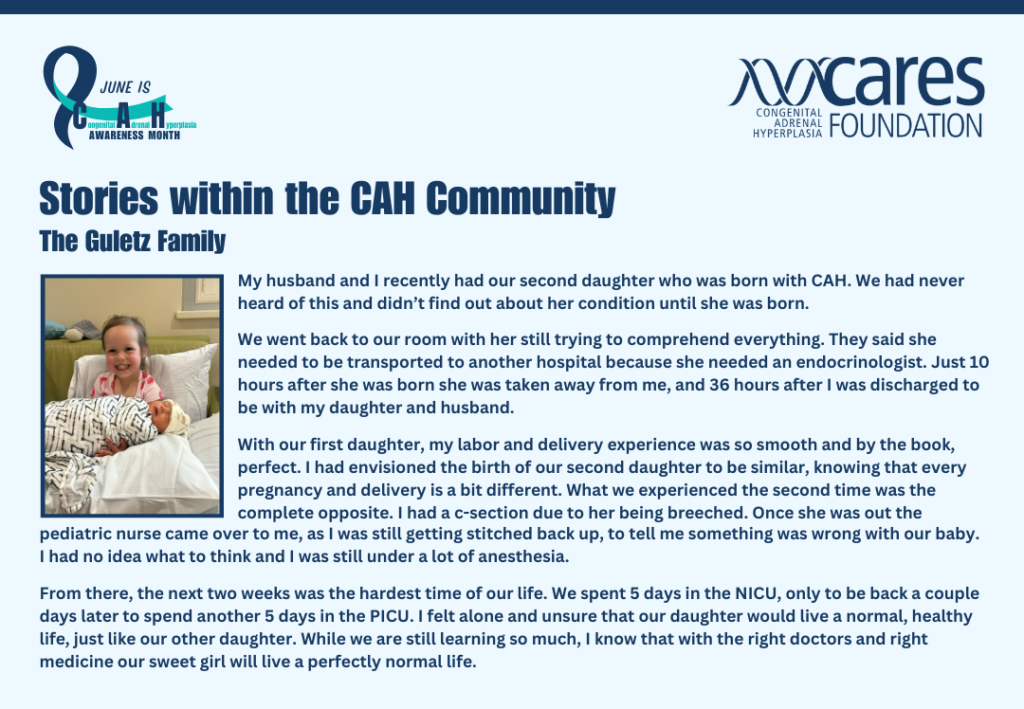
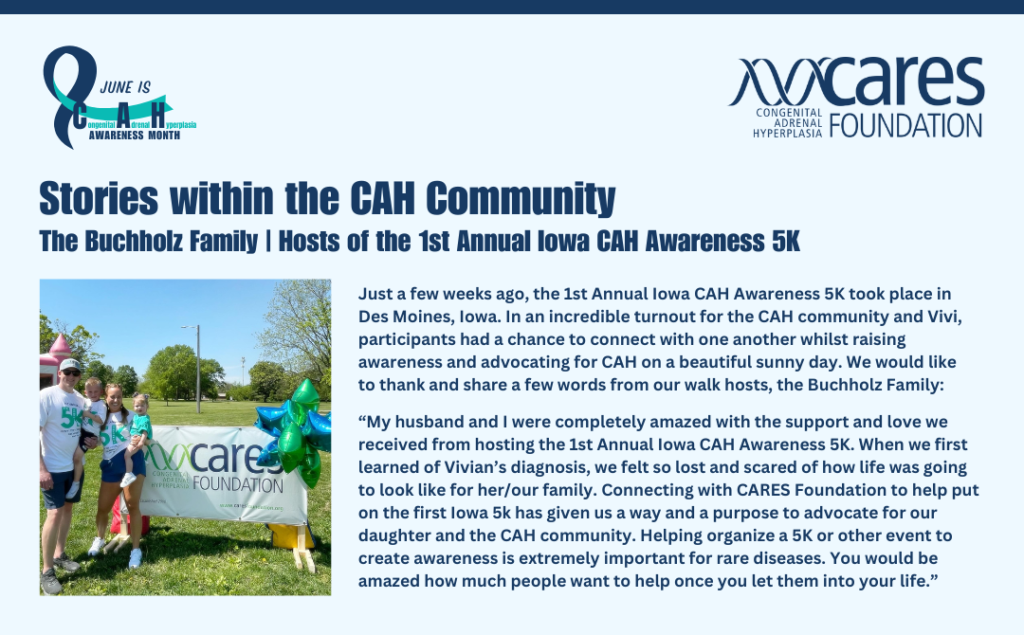
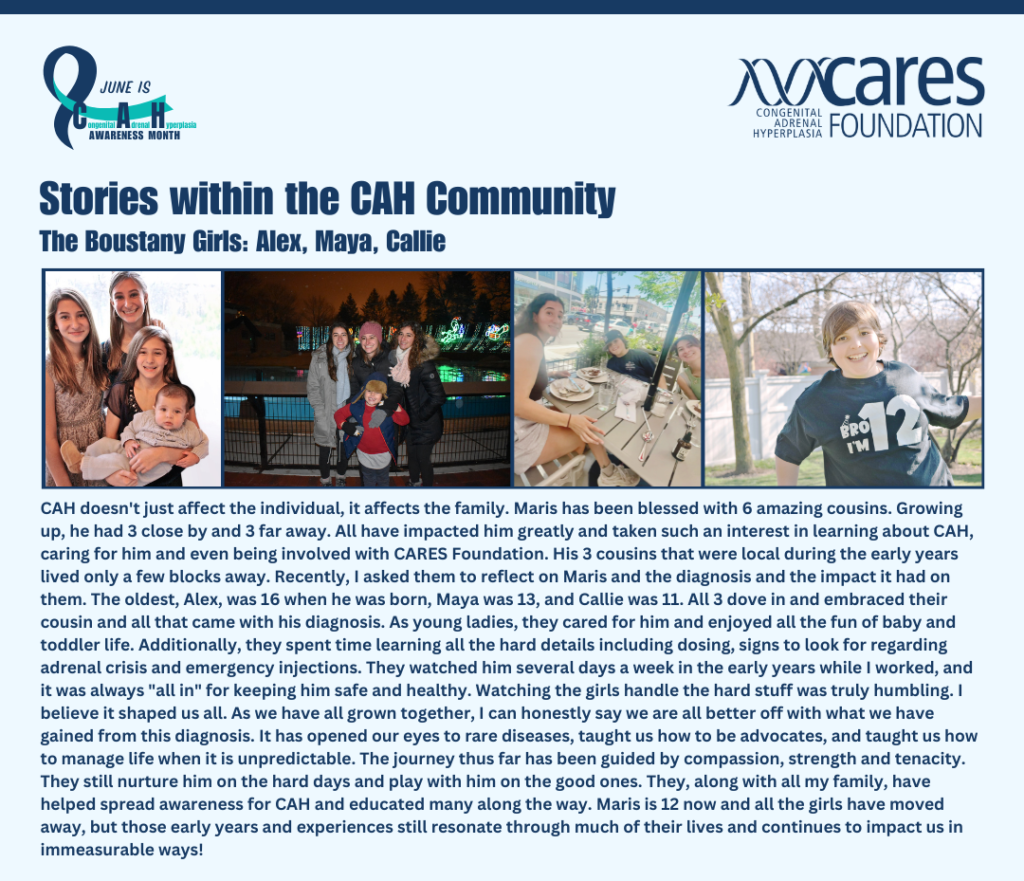
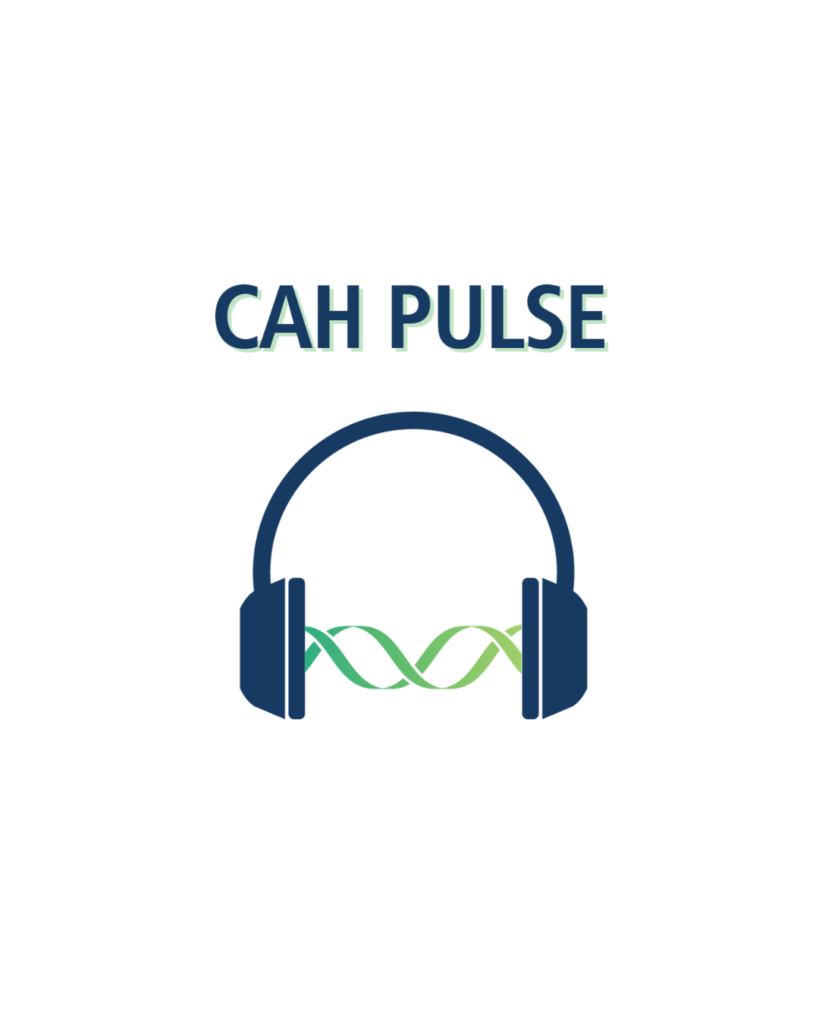
Catch up on all of our podcast episodes this month!
CAH Pulse takes us on a journey to educate and bring attention to the challenges and triumphs of individuals living with Congenital Adrenal Hyperplasia (CAH). Throughout CAH Awareness Month, listen to patients, family members, medical professionals, researchers and caregivers share their stories, experiences and advice living with this challenging condition. Our hope is to further connect and champion this incredible community.
BE PREPARED IN AN EMERGENCY
SIGNS OF ADRENAL CRISIS | Learn about what an adrenal crisis looks like
Acute adrenal crisis is a life-threatening condition that occurs when there is not enough cortisol. This is a hormone produced by the adrenal glands.
Causes
Causes
The adrenal glands are located just above the kidneys. The adrenal gland consists of two parts. The outer portion, called the cortex, produces cortisol. This is an important hormone for controlling blood pressure. The inner portion, called the medulla, produces the hormone adrenaline (also called epinephrine). Both cortisol and adrenaline are released in response to stress.
Cortisol production is regulated by the pituitary. This is a small gland just underneath under the brain. The pituitary releases adrenocorticotropic hormone (ACTH). This is a hormone that causes the adrenal glands to release cortisol.
Adrenaline production is regulated by nerves coming from the brain and spinal cord and by circulating hormones.
People who do not have adrenal insufficiencies naturally produce up to ten times the normal amount of cortisol, which is vital to the maintenance of blood pressure and heart muscle tone, as well as sugar and salt balance, during times of physical stress. When illness or injury occurs in adrenally insufficient individuals, however, an immediate additional dose of glucocorticoids (hydrocortisone) is necessary to avert adrenal crisis. Delay in administration of these medications can lead to shock, heart failure and death.
Signs of adrenal crisis, which are not readily identifiable, include:
Signs of adrenal crisis, which are not readily identifiable, include:
- Pallor
- Dizziness
- Headache Weakness/lethargy
- Abdominal pain
- Vomiting/nausea
- Hypoglycemia
- Hypotension
- Shock Heart failure
To learn more, and find a variety of resources to help you stay better prepared in the event of adrenal crisis, please visit https://caresfoundation.org/be-prepared-in-an-emergency/.
VISIT YOUR LOCAL FIREHOUSE/EMS SERVICE
TO BE PREPARED FOR AN EMERGENCY, YOU MUST MAKE SURE YOUR LOCAL FIREHOUSE AND/OR EMS STATION IS AWARE OF YOUR OR YOUR CHILD’S ADRENAL INSUFFICIENCY/CAH STATUS! WE URGE YOU TO VISIT YOUR FIREHOUSE/EMS STATION RIGHT AWAY! Develop an individualized plan in the event of an adrenal crisis.
Ask your EMS provider to flag your address in the 911 system so that emergency personnel are aware of your adrenal insufficiency statues.
Ask your EMS provider if your state has an identification system for those with special medical needs. These programs alert EMS providers of emergency treatment needed for those with a medical condition. These programs can include:
Premise Alert Notification SMART 911 (Ask your EMS provider if your state has an identification system for those with special medical needs. These programs alert EMS providers of emergency treatment needed for those with a medical condition. These programs can include:
- SNAP (Special Needs Alert Program)
- STARS (Special Needs Tracking and Awareness Response System) see American Academy of Pediatrics article abstract about STARS
- Yellow Dot
For a successful EMS provider visit, print a copy and bring with you:
- EMS Provider Visit Tip Sheet
- Emergency Instructions Brochure
- Medication Safety Alert (EMS Protocols for Adrenal Crisis)
- Medication Safety Alert Letter
EMS ORGANIZATIONS AND PROVIDERS: BE SURE to access the documents linked above for VITAL INFORMATION to help you better serve your communities.
WEAR/CARRY MEDICAL I.D. | Why it's important & what is should say
All leading practitioners recommend that you always wear a medical ID.
In an accident or medical emergency like adrenal crisis, your medical ID will immediately alert emergency personnel to your condition. First responders are trained to look for a medical ID and they will ensure you get the correct treatment as quickly as possible.
If you are living with adrenal insufficiency, a medical ID could save your life.
What type of I.D.?
What type of I.D.?
- All people who are Adrenal Insufficient/Steroid Dependent should wear Medical Identification that says: Adrenal Insufficient/Steroid Dependent, Administer Solu-Cortef® (with appropriate dosage), AND date of birth. You can also consider listing the specific diagnosis “congenital adrenal hyperplasia” or health status “cortisone dependent” or even “treat with hydrocortisone.”
- If you have any questions as to what information you should put on your or your child’s medical alert identification, CARES Foundation encourages you to discuss this with your endocrinologist. At a minimum, however, “adrenal insufficiency” should be on the identification and it should come first.
- CARES Foundation offers a practical medical I.D. for kids and those who lead a more active lifestyle. See our Medical I.D./Shoe Tags/Luggage Tags in the CARES Shop on our website.
- MedicAlert Foundation is a highly recognized service and I.D. shop. Memberships come with a 24/7 Emergency Response Team with access to members’ health records and the team is trained to provide critical information to first responders.
Print & download wallet-sized medical I.D. cards with you on a daily basis
We recommend that you always have a Medical I.D. with you at all times in the event of adrenal crisis. Please visit https://caresfoundation.org/be-prepared-in-an-emergency/ to download our printable medical I.D. cards to place in your wallets for every day use.
CONTACT
2414 Morris Avenue, Ste 110
Union, NJ 07083
Phone: (908) 364-0272
Toll Free: (866) 227-3737
Fax: (908) 686-2019
contact@caresfoundation.org


